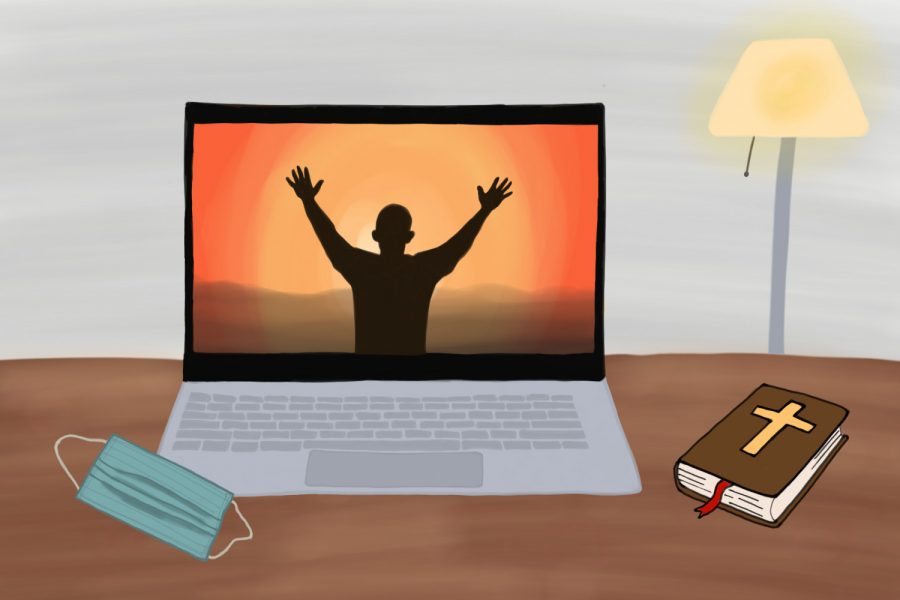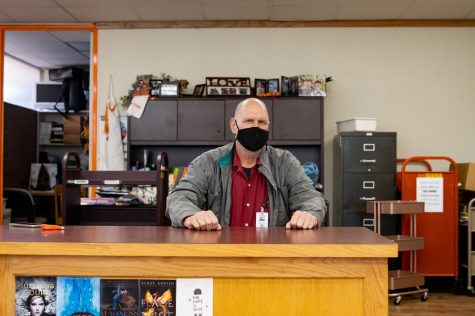Taking scripture to our screens
Local churches move to online services amidst the coronavirus crisis
Graphic
April 4, 2020
For many, church is one of the only consistencies in their life. After one’s hectic, stressful week, the only thing they can be sure of is that familiar faces will greet them every Sunday at their place of comfort, their place of refuge. When ideas as important as eternal salvation are regular discussion, the worries of everyday life pale in comparison.
So, when local church leaders are forced to shut their doors, it’s a testament to the seriousness of this pandemic. Many of these churches have gone years upon years with a service every Sunday; which makes seeing their parking lots, sanctuaries, and buildings eerily empty on Sunday morning all the more unreal.
But through this abnormal situation, we can also see tremendous resilience. For local pastors, there is no other option but one. A message will be given every week, even if it means making a massive shift: bringing scripture to the internet rather than in person.
“We knew right when they decreased the amount of people that could gather together to ten, that we can’t have a typical church service,” Kyle Peters, pastor of Myrtle Springs Baptist Church, said. “We typically have over 200 people in our congregation, so it wouldn’t work. We suspended our services for two weeks, but it will probably go on longer than that.”
Along with Myrtle Springs, other local churches saw the warning signs of the coming crisis and planned accordingly.
“From my Facebook group of pastor friends, I heard they were going to start shutting down group gatherings,” Bubba Rainwater, pastor of Cross Pointe Baptist Church, said. “At first I took the news as a philosophical exercise: what would you do if the government told you not to have church? Then, it happened.”
While both churches recognized the need to avoid services, opinions differed, and still do, on the severity of the situation. There was no consensus on if suspending church was truly necessary when it first became recommended. But then it was mandated.
“At the beginning, I was very skeptical,” Rainwater said. “I really felt like the response was overblown. We’ve got to have some balance to our response, so we don’t have people just bunkering down for 3 months. It’s like the president said: I feel the cure might be worse than the disease.”
Many church leaders disagree, and praise local leadership for mandating action so soon. At the base level, these differing opinions were caused by sourcing information differently. Churches with ties to local leadership, like Myrtle Springs, had more faith that such a response was necessary.
“My main person I went to for early information was our worship leader Kevin Schutte, who is also the Texarkana Police Chief,” Peters said. “I kept in close contact with him and knew that the information I was getting from him was true. If he felt our response was the best option, then I did too.”
Both of these churches and more reexamined their options, and with no possibility of meeting in person, they decided to organize online services. Whether pre-recorded and posted to their respective websites or live streamed on YouTube, in just a few days, church became digital. These online substitutions for the regular Sunday meetings include musical worship portions, led by music, and a message from the pastor, both elements being necessary to imitate the traditional Sunday experience.
Obviously, after such a significant change in the way worship is done, it can be hard to continue with the same subject matter as before. Myrtle Springs felt that at least for the first Sunday, it was warranted to switch from a sermon as usual to one intended to comfort the congregation through uncertain times.
“This last Sunday, I spoke very pointedly to the crisis that we’re going through, and how there is still control no matter what happens,” Peters said. “I felt that at least for that first Sunday, it was appropriate to first address what’s going on.”
Instead of changing from the sermons that were planned in advance like many churches chose to do, Rainwater found that his material lined up nicely with the current situation, and would still be an appropriate message.
“This past week my message was on the days before the crucifixion, and the disciple’s questions about what would happen in the end times,” Rainwater said. “I was teaching on the end times before all this started. So just coincidentally, appropriate subject matter fell into my lap.”
However, the challenges of bringing worship online go further than selecting an appropriate message. There are distinct difficulties to bringing all parts of a church service online with so little notice.
“We are concerned about making sure everyone is administered throughout the week; it can be especially hard to make sure everyone is praying for each other and holding each other accountable,” Peters said. “Secondly, we have to make sure everyone is engaged with the service when they watch.”
Engaging in an online service can be challenging, and is a problem that goes both ways during these services. Pastors and worship leaders are also accustomed to the classic Sunday service, so moving online is a shake up for not only more than the congregation, but these leaders as well.
“In our services, I play off the reaction of people’s faces. I like to talk to people, individuals, and not just stay at the podium and talk,” Rainwater said. “So for me, the hardest thing is not having people in front of me to teach. I brought in 8 to 10 people last Sunday, so I could teach to them, and just have the camera capture it, because, for me, nothing sounds more meaningless than just talking into a camera.”
Through all of these challenges, those behind the services stepped up with solutions to make sure that church members could count on a service even when church was out of session. All that’s left for church goers to do is log on, and log onthis they did. Myrtle Springs recorded about 150 viewers during their livestream, many of these likely being whole families. And according to their Facebook page, over 2700 people have watched either part or all of the service.
It’s clear churches online are reaching as many and perhaps more than would regularly attend a service, so how are congregations reacting? Overwhelmingly, well.
“Our congregation is appreciative of the fact that we can do online worship services,” Peters said. “They understand that we’re not trying to go against the wishes of our national, state, and local leaders. They appreciate that we’re trying to make it as normal as possible.”
This experience has been for the most part, more eye-opening than unfortunate for these churches. Local churches are appreciative of the kinds of lessons that can come out of crisis like these.
“We’re still the church, regardless if we’re meeting in a central location or a building,” Peters said. “God still called us to do the very same things he’s always called us to, just in different ways. Secondly, we’ve learned just how thankful we are to live in an age of technology where even if we can’t meet in a physical building, we can still worship together on an online platform.”
There are also, according to Rainwater, lessons to be learned in whether or not the church has done what it ought to, in the years before. He is looking forward to the kind of “performance-review” that the situation will create.
“It’s really going to expose whether the church has been equipping, or just entertaining” Rainwater said. “Ideally, members will be prepared to disciple their families and do ministry for themselves. They shouldn’t need a pastor every Sunday, if I’ve done my job.”
It’s unclear how long regular services will have to substitute Sunday morning meetings, but what is clear is that moving churches online has its blessings, according to local churches. Expanding outreach, eventually perfecting these broadcasts, and challenging worshipers with independence are all benefits that make the prospect of possible months more of online services seem more and more like a blessing.
“I think about the fact that there’s probably more lost people that were reached with the gospel this past Sunday, with thousands of churches meeting online,” Peters said. “I would hope that we continue to reach as many people as possible. I know that one day we’ll be able to meet again in our building, and I hope then I see some people we’ve touched through our online services want to be a part of our church when that does happen.”





















